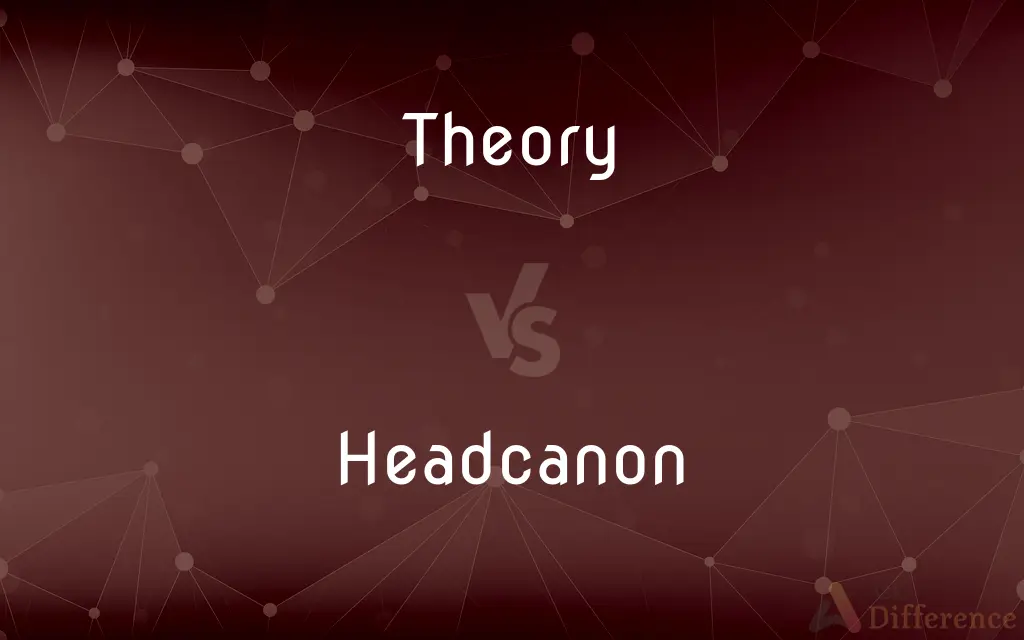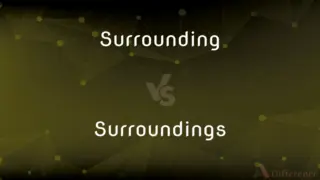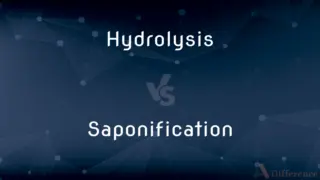Theory vs. Headcanon — What's the Difference?
Edited by Tayyaba Rehman — By Fiza Rafique — Updated on March 29, 2024
A theory is a well-substantiated explanation, often based on evidence and reasoning. Headcanon refers to personal beliefs about a story not confirmed by the source material.

Difference Between Theory and Headcanon
Table of Contents
ADVERTISEMENT
Key Differences
A theory in scientific and logical contexts is a well-substantiated explanation of some aspect of the natural world or a coherent group of tested general propositions, based on evidence and reasoning, that can predict future occurrences or observations. Whereas headcanon represents an individual's personal beliefs, interpretations, or speculations about a story, character, or element in a narrative that isn't officially confirmed or acknowledged by the source material.
While theories are often developed through observation, experimentation, and analysis, and are open to testing and falsification, headcanons are more about personal enjoyment and individual interpretation. They are not meant to be tested against the canonical material but rather exist alongside it to enhance personal engagement with the story.
Theories require a basis in factual evidence or logical deduction and are subject to peer review and scrutiny in the scientific community. On the other hand, headcanons are shared within fan communities as a way to express creativity and explore narrative possibilities that official sources have not addressed.
Headcanon can enrich the experience of a narrative by allowing fans to explore dimensions of characters, settings, or events that are not fully explored in the canonical material. It allows for a personal connection with the story, often leading to fan fiction, art, and discussions. Meanwhile, theories, by requiring evidence and logical structure, enrich scientific understanding and provide a basis for further inquiry and exploration.
Comparison Chart
Basis
Evidence and reasoning
Personal belief or speculation
ADVERTISEMENT
Purpose
To explain phenomena and predict future observations
To enrich personal engagement with a story
Validation
Subject to testing, falsification, and peer review
Not typically subject to validation against canonical material
Community Response
Discussed and scrutinized in scientific or logical contexts
Shared and celebrated in fan communities
Impact on Original Work
Enhances understanding and predictability
Expands narrative possibilities without altering canon
Compare with Definitions
Theory
A coherent group of propositions formulated to explain a group of facts or phenomena in the natural world and repeatedly confirmed through experiment or observation.
The theory of relativity revolutionized how we understand space and time.
Headcanon
Personal interpretations or beliefs about a story or characters that are not part of the official canon.
Fans often have headcanons about the backstory of a minor character in their favorite series.
Theory
Often serves as a basis for further hypothesis and experimentation to validate its predictions.
The germ theory of disease led to advancements in medical treatments and hygiene practices.
Headcanon
Can vary widely among different fans of the same material, leading to diverse interpretations.
There are as many headcanons about the ending of the story as there are fans.
Theory
Subject to change or refinement as new evidence becomes available.
Nutritional theories are regularly updated with new research findings.
Headcanon
Allows fans to fill in gaps or expand on the story in ways that resonate with them personally.
My headcanon is that these two characters are best friends, even though it’s never explicitly stated in the book.
Theory
Requires substantial evidence and rigorous testing to be widely accepted within the scientific community.
The theory of evolution by natural selection is supported by extensive fossil records and genetic data.
Headcanon
Often shared within communities, leading to discussions, fan fiction, and art.
This headcanon inspired me to write a story that explores the character's hidden motives.
Theory
Can predict future events or discoveries based on established principles.
Quantum theory has predicted phenomena that were later confirmed by experiments.
Headcanon
Not officially recognized by the creators of the original material but valued for personal and community engagement.
While my headcanon isn’t canon, it deepens my connection to the story.
Theory
A theory is a rational type of abstract thinking about a phenomenon, or the results of such thinking. The process of contemplative and rational thinking is often associated with such processes as observational study or research.
Headcanon
(fandom slang) Elements and interpretations of a fictional universe accepted by an individual or small group of fans, but not necessarily found within or supported by the official canon.
In my own headcanon of Rocky IV, Ivan Drago is a Russian Mafia enforcer instead of a Red Army Captain.
Theory
A set of statements or principles devised to explain a group of facts or phenomena, especially one that has been repeatedly tested or is widely accepted and can be used to make predictions about natural phenomena.
Headcanon
(fandom slang) To interpret in the form of a headcanon.
I headcanon her as gay.
Theory
The branch of a science or art consisting of its explanatory statements, accepted principles, and methods of analysis, as opposed to practice
A fine musician who had never studied theory.
Theory
A set of theorems that constitute a systematic view of a branch of mathematics.
Theory
Abstract reasoning; speculation
A decision based on experience rather than theory.
Theory
A belief or principle that guides action or assists comprehension or judgment
Staked out the house on the theory that criminals usually return to the scene of the crime.
Theory
An assumption based on limited information or knowledge; a conjecture.
Theory
A description of an event or system that is considered to be accurate.
Theory
(sciences) A coherent statement or set of ideas that explains observed facts or phenomena and correctly predicts new facts or phenomena not previously observed, or which sets out the laws and principles of something known or observed; a hypothesis confirmed by observation, experiment etc.
Theory
(uncountable) The underlying principles or methods of a given technical skill, art etc., as opposed to its practice.
Theory
(mathematics) A field of study attempting to exhaustively describe a particular class of constructs.
Knot theory classifies the mappings of a circle into 3-space.
Theory
A hypothesis or conjecture.
Theory
A set of axioms together with all statements derivable from them; or, a set of statements which are deductively closed. Equivalently, a formal language plus a set of axioms (from which can then be derived theorems). The statements may be required to all be bound (i.e., to have no free variables).
A theory is consistent if it has a model.
Theory
A doctrine, or scheme of things, which terminates in speculation or contemplation, without a view to practice; hypothesis; speculation.
Theory
An exposition of the general or abstract principles of any science; as, the theory of music.
Theory
The science, as distinguished from the art; as, the theory and practice of medicine.
Theory
The philosophical explanation of phenomena, either physical or moral; as, Lavoisier's theory of combustion; Adam Smith's theory of moral sentiments.
Theory
A well-substantiated explanation of some aspect of the natural world; an organized system of accepted knowledge that applies in a variety of circumstances to explain a specific set of phenomena;
Theories can incorporate facts and laws and tested hypotheses
True in fact and theory
Theory
A tentative theory about the natural world; a concept that is not yet verified but that if true would explain certain facts or phenomena;
A scientific hypothesis that survives experimental testing becomes a scientific theory
He proposed a fresh theory of alkalis that later was accepted in chemical practices
Theory
A belief that can guide behavior;
The architect has a theory that more is less
They killed him on the theory that dead men tell no tales
Common Curiosities
Is it possible for a theory to be proven wrong?
Yes, theories can be challenged and revised or rejected in light of new evidence or better explanations.
How do headcanons enhance the experience of a story?
They allow individuals to engage creatively, filling gaps or expanding on story elements in a personally meaningful way.
What role do theories play outside of science?
In broader contexts, theories can provide explanations or frameworks for understanding various aspects of reality, including social phenomena.
What makes a theory different from a hypothesis?
A theory is a well-supported explanation, while a hypothesis is a tentative assumption made to draw out and test its logical or empirical consequences.
Why are theories important in science?
They provide a framework for understanding complex phenomena and guide future research and experimentation.
Can a headcanon become canon?
Rarely, but it happens when creators adopt popular fan interpretations into the official narrative.
What distinguishes a good theory from a bad one?
A good theory is falsifiable, predictive, and has broad explanatory power; a bad one lacks these qualities.
Are headcanons ever harmful?
They can be if they disregard the original work’s themes or disrespect its characters, but generally, they’re a positive form of engagement.
Why do people create headcanons?
To personalize their experience of a narrative, explore unaddressed aspects, or express creativity.
Do all fans of a story share the same headcanons?
No, headcanons are highly individual and can vary widely even among fans of the same story.
How do creators respond to headcanons?
Responses vary; some embrace fan interpretations, while others prefer to keep their narratives fixed.
Can a theory exist without empirical evidence?
In science, theories require empirical evidence; in other contexts, theories might be speculative but generally still require some form of logical or evidential support.
How do theories evolve?
Through the process of scientific inquiry, including testing, falsification, and refinement based on new evidence.
Can theories apply to the humanities as well as the sciences?
Yes, theories can also frame understanding in the humanities, such as literary theory or theories of art.
What impact do headcanons have on fan communities?
They can foster creativity, discussion, and a deeper connection to the material among fans.
Share Your Discovery

Previous Comparison
Surrounding vs. Surroundings
Next Comparison
Hydrolysis vs. SaponificationAuthor Spotlight
Written by
Fiza RafiqueFiza Rafique is a skilled content writer at AskDifference.com, where she meticulously refines and enhances written pieces. Drawing from her vast editorial expertise, Fiza ensures clarity, accuracy, and precision in every article. Passionate about language, she continually seeks to elevate the quality of content for readers worldwide.
Edited by
Tayyaba RehmanTayyaba Rehman is a distinguished writer, currently serving as a primary contributor to askdifference.com. As a researcher in semantics and etymology, Tayyaba's passion for the complexity of languages and their distinctions has found a perfect home on the platform. Tayyaba delves into the intricacies of language, distinguishing between commonly confused words and phrases, thereby providing clarity for readers worldwide.
















































